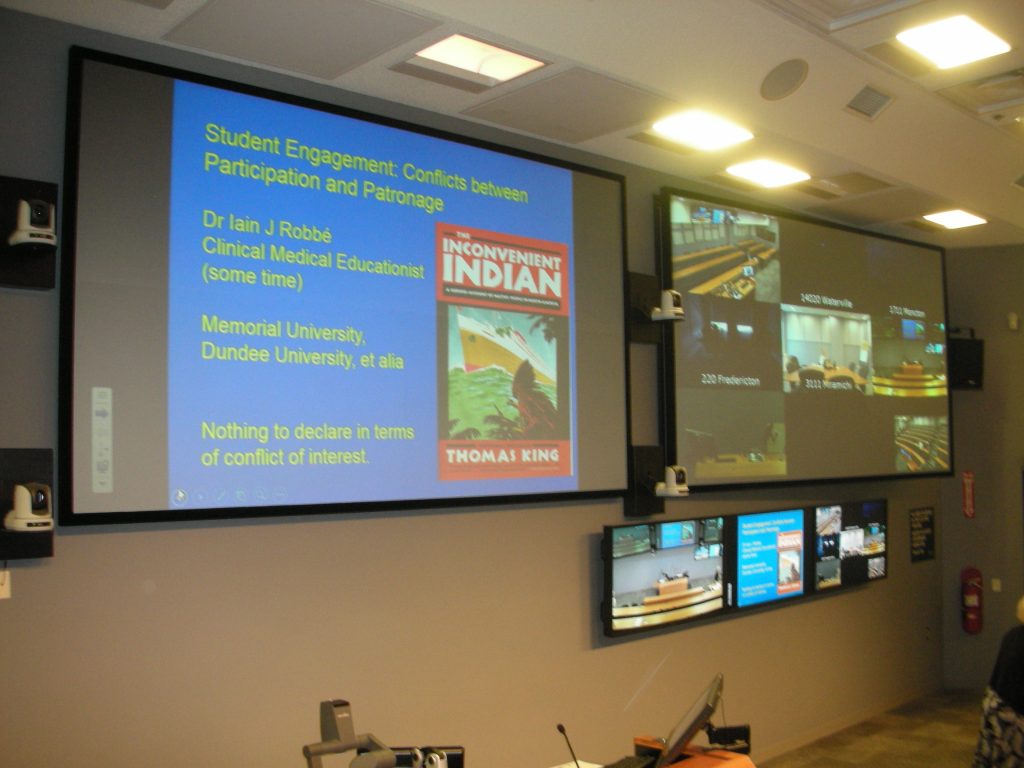Picture: reflection and the fluidity of professional identity
The fluidity of professional identity
Pre-amble:
I have been collaborating with Dr. Stephanie Best and Professor Sharon Williams on research into professional identity since the spring of 2017. Stephanie and Sharon have been researching professional identity for some years and I was invited to join them because of my teaching and research in professionalism, ethics, and communications. I wrote about my preliminary conclusions on the research in the fall of 2019; see http://www.iainrobbe.com/labour-day-identity/
It has been a pleasure to collaborate with Stephanie and Sharon because of their creativity and enthusiasm. Our multidisciplinary trio have brought complementary perspectives to the research, we have published three papers(1,2,3), and there are links to some of my earlier work with Dr. Elizabeth Mossop and others(4,5).
The papers are available from Stephanie or from me for personal usage including teaching and research with the appropriate attributions.
Professional identity can be broadly defined as the knowledge, attitudes and behaviours of a specific profession (Wenger, 2000). Individuals applying to begin education in a profession have formed some professional identity due to their cultural and societal experiences but their professional identity develops rapidly during their undergraduate education as they participate in the social learning systems of their professional school and they become enculturated into their communities of practice (Wenger, 2000).
The hidden curriculum describes the influences on student learning that are outwith the official curriculum (Hill, et al., 2014). These influences come from others in the professional community(5), they affect the attitudes, beliefs and behaviours of the learners, and they can be constructive or self-defeating in professional practices (Wenger, 2000).
The research:
A brief summary of the papers begins with the 2020 paper(1) where we used appreciative inquiry to investigate what issues in professional identity could be used constructively in multidisciplinary teams. We found that the key issues of self-awareness, building trust, and the flexible use of power are beneficial to the functioning of the team. In particular, a willingness to be flexible with the use of professional power can bring out positive aspects of the hidden curriculum regarding inclusiveness within the team.
In the 2021 paper(2) we used a signature pedagogy methodology to identify how professionals think, perform and act with integrity in multidisciplinary teams. We found that acting with integrity is well established as part of professional identity. However thinking and performing are more challenging due to the need to balance professional identity on the one hand with flexibility in team working on the other hand.
Incidentally it was gratifying to see the nominal group technique used to good effect because I had found it was very helpful in my dissertation for the Master in Medical Education degree.
In the 2022 paper(3) we analysed the impacts of a 2.5 hour workshop on the participants from multidisciplinary teams in relation to their perceptions of professional identity. We found positive views about professional identity because of the confidence it gave regarding their knowledge, skills and expertise. However more support was needed for reflection and for active planning to discuss role ambiguities so that professional identity could be used constructively in daily team work.
Conclusions:
I discussed my preliminary conclusions in the fall of 2019 and working on these papers(1,2,3) has clarified my thinking.
Professional identity is in the process of forming before entry into a profession and it develops rapidly in the early years. It can be a negative force if it over-emphasises the exceptionalism of the profession, the firmness of the rules regarding attitudes and behaviours, and the fixed nature of identity. This negativity can occur particularly if the hidden curriculum has a strong influence on these issues(4).
However professional identity can be a positive force if the practitioner has learnt the crucial importance of reflection and the need to be flexible so that they view professional identity as fluid. In the field of anthropology the value of reflection is well-recognised; so too are the values of respect for diversity, empathy and a willingness to think of groups (Tett, 2021). All these values apply to multidisciplinary teams.
In the field of sociology, the value of reflection is also well-recognised because it helps to control for biases (Wacquant, 2002), to reveal the rituals of a society(5), e.g. the society of the multidisciplinary team, and to identify other aspects of the hidden curriculum (Hill, et al., 2014).
Connecting all these points together leads me to the conclusion that an effective member of a multidisciplinary team needs to be a reflective practitioner who recognises the fluidity of professional identity.
Hill, E. J. R., Bowman, K., Stalmeijer, R., & Hart, J. (2014). You’ve got to know the rules to play the game: How medical students negotiate the hidden curriculum of surgical careers. Medical Education, 48(9), 884-894. doi:10.1111/medu.12488
Tett, G. (2021). Anthro-vision. How anthropology can explain business and life. London: Random House Business.
Wacquant, L. J. D. (2002). The sociological life of Pierre Bourdieu. International Sociology, 17(4), 549-556. doi:10.1177/0268580902017004005
Wenger, E. (2000). Communities of practice and social learning systems. Organization, 7(4), 225-246. doi:10.1177/135050840072002
Publications on professional identity, the hidden curriculum, and enculturation –
(1)Best, S., Robbé, I. J., & Williams, S. (2020). Mobilizing professional identity in multidisciplinary teams: An appreciative inquiry. International Journal of Healthcare Management, 15(1), 132-141. doi:10.1080/20479700.2020.1862399
(2)Best, S., Beech, C., Robbé, I. J., & Williams, S. (2021). Interprofessional teamwork: The role of professional identity and signature pedagogy – a mixed methods study. Journal of Health Organization and Management, 35(5), 561-578. doi:10.1108/jhom-06-2020-0242
(3)Best, S., Beech, C., Fletcher-Miles, H., Eynon-Jones, S., Robbé, I. J., & Williams, S. (2022). Moving out of the silo: trialling a work-based education intervention to mobilise professional identity in integrated teams. British Journal of Healthcare Management, 28(2), 1-10. doi:10.12968/bjhc.2020.0186
(4)Mossop, L., Dennick, R., Hammond, R., & Robbé, I. J. (2013) Analysing the hidden curriculum: Use of a cultural web. Medical Education, 47(2), 134–143. doi:10.1111/medu.12072
(5)Robbé, I. J. (2014). Revealing the hidden curriculum and reducing cultural reproduction: Small steps on a long road. Medical Education, 48(9), 846–848. doi:10.1111/medu.12524

